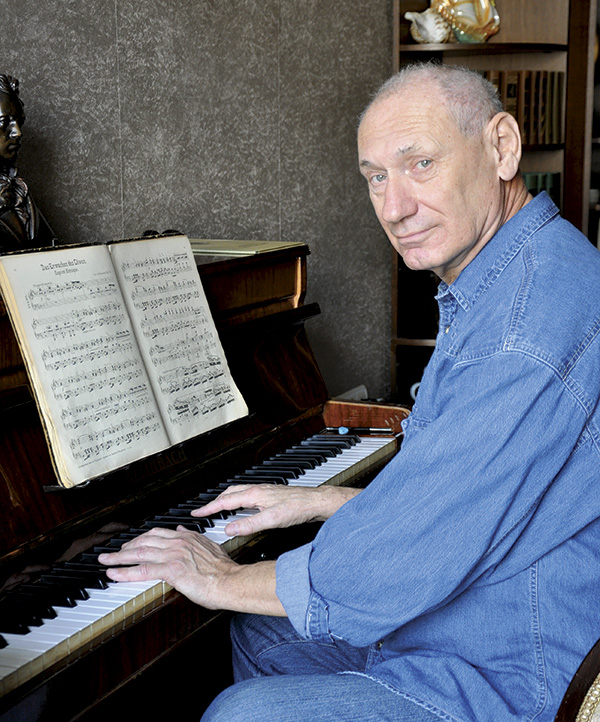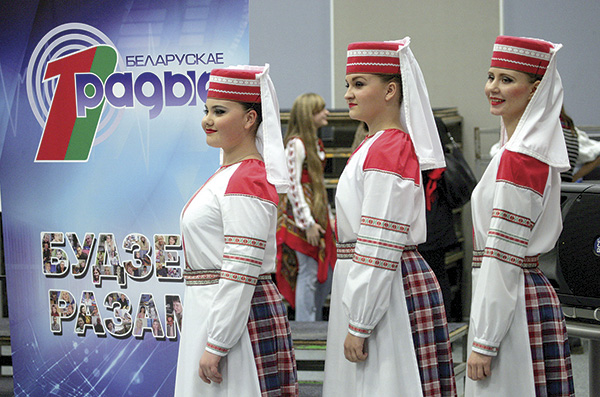
The Young Talents of Belarus contest is truly unique — covering all branches of the musical arts and uniting vocal performers, instrumentalists and choir ensembles. Youngsters gather from all over Belarus to demonstrate their talent and, when the contest has ended, the winning songs — performed by the writers themselves — are broadcast on the radio for a year! Moreover, the prize winners get an opportunity to receive a scholarship from the President’s Special Fund for the Support of Talented Youth. This year, around 300 applications have been sent to the contest and a hundred young people have gained entry.
Artistic competitions of the kind are not merely a spectacular show. They make it possible to appreciate the level of young performers in the context of global musical art and its modern development. Only experienced and well known professionals are able to judge them fairly. Among them is Eduard Zaritsky. He heads the Young Talents’ jury which also unites famous artistes, composers, directors and producers. Moreover, he boasts rich ‘judging’ experience at other contests — including the Junior Eurovision. Our present guest is a People’s Artiste of Belarus, a composer, a conductor and the Deputy Chairman of the Belarusian Composers’ Union.
Mr. Zaritsky has composed many musical pieces — such as symphonies, suites, concerts and over six hundred songs (performed by famous Belarusian and Russian singers in the CIS and beyond), as well as music for dramatic performances and films. He composes often for the Mikhail Finberg National Academic Concert Orchestra and spends much of his working time at this popular team’s office or at the rehearsal hall. On agreeing to our meeting, I planned my questions with the aim of finding out his thoughts on the importance of these competitions. Interestingly, not all winners remain on the music circuit for long.

The Young Talents of Belarus contest demonstrates that our country has many talented young people who wish to sing. What do we need to win a Eurovision contest, for example?
Eurovision is a great lottery. A song might be appreciated by professionals but audiences don’t choose it. The opposite is also possible. It’s hard to predict public tastes. Do you remember Denmark’s Emmelie de Forest who won the 2013 Eurovision? The barefooted singer conquered the hearts of everyone with her wonderful hair and singing. It’s hard for me to understand however, the victory of the Finnish Lordi band in 2006. Of course, some people love hard rock and modern youth has become familiar with it — attending many concerts. The sounds they produce seem to me like the noise of a steam hammer. Just as it’s impossible to eat fast food all the time, as it will make you ill, the same applies to music.
In our modern times, many people write songs and compose music. They also arrange it and then perform. Is this good or bad?
Sadly, it’s fashionable now to compose music, having no idea of the technical skills involved. Young people are often proud of this — saying that they’ve never studied music and don’t even play an instrument. This is not good or bad; it’s the reality. However, you’d probably agree that these songs would never achieve the popularity of ‘Moscow Nights’ or ‘Katyusha’, which have been sung for decades. People should make the effort to achieve a certain standard and create a quality product. I say this being a lazy man myself.
I’m sure you haven’t been awarded a People’s Artiste award because you are lazy…
All discoveries are made by lazybones. Who invented the vacuum cleaner? Someone who wished to get rid of dust in the shortest possible time. The same happened to me: I set a task and nobody else would have solved it.
Being a professional, it’s probably easy for you to distinguish true talent…
Not at all. This is the job of a whole team. Do you watch our ‘Academy of Talent’ programme? We are attempting to set aside subjectivity. Of course, we pay attention to singers’ vocal abilities and artistry. We discuss and make predictions on how a singer would build up their career in the future. We are also interested in their teachers and the background to their singing talent. Some come ‘from the street’ but there are few of these. Most singers have trained and prepared. A talent is often revealed owing to the turn of events. My musically educated parents were an important factor in defining my professional future. My mother was a singer and my father played trombone. There was never silence in our house. I heard music from my childhood and, with this in mind, I recommend that all mothers sing songs to their babies — even before they are born.
What problems do young artistes face? A competition win does not guarantee success in their future career…
Winners naturally do face difficulties, as do those who are not in first place. In line with the rules of many competitions, only one winner can be chosen — although the top five or even ten enjoy equal opportunities. As a result, when only one person wins, a backstage drama ensues. Mothers especially, are often angry, even talented youngsters disappear from public view mostly because they were never keen to be on the stage in the first place. Some performers suffer from great disappointment after several defeats and disappear in the course of time. The situation was different in the past when those occupying second and third places promoted themselves to become popular, while the winners faded from public view. Of course, financial problems also exist. In my own youth, you could often find a free recording studio. Moreover, radio stations not only accepted songs but even paid for them. Modern young people experience difficulties in promoting themselves.
In short, it’s not enough to enjoy the support of the fans to appear on a major stage…
History shows us many different examples — just think of Anna German or Edith Piaf. I believe music is a vocation which will always take you to on the right path.
What should a young artiste do to further make a name for themselves, in your opinion?
Persistence is vital to succeed in the music world. It’s also necessary to keep learning new things. I personally continue studying with pleasure. It’s funny to remember my childhood when I rebelled against playing my instruments. Mikhail Zhvanetsky once said wisely: ‘A violin is a fragile piece of plywood but it has ruined so many young lives.’ While studying at Music College, I had ambitions to compose something and, at the age of 16, I was a member of the first pop orchestra — involving the same young guys as me. Later I worked at the Young Spectator’s Theatre as a conductor, also composing music for performances. You know, children are a special audience: they are able to spot anything wrong immediately. Being a conscripted soldier, I then composed a song for the military and, while touring with the KVN team, I had to compose something new each morning, to hear audiences’ reaction to my work in the evening. That period formed my understanding of what the public loves.
How is our music appreciated abroad?
I’ve noticed a paradox: everyone reacts similarly to a certain part of my concerts in Belarus or Western Europe. It might appear strange, as foreigners do not know our language and don’t understand the sense of our songs. Why this happens and what touches them is a puzzle for me. I assume that Belarusian songs enjoy a unique melody: on hearing just a couple of notes, the whole harmony appears in the mind. The entire song is guessed on just hearing the first musical phrase.
What are your criteria for success?
It seems to me I’m successful as I’m able to enjoy others’ success and don’t envy anyone. This has been natural to me from a young age. The success of others acts as a stimulus telling me I need to work harder. The supreme moment of people’s recognition for me is to hear my ‘Victory Day’ composition, instead of a march, during a solemn parade in the centre of Minsk.
Most of your songs are of love. Are there any other common themes?
Love is the driving force of life. It’s a symbol of the origin of everything that lives. I can express it in music which, in turn, is everything to me. I have loved music since my childhood and I love the process of composing — either when I fail to succeed immediately or when I feel that someone from heaven is dictating the notes. In this case, I sit down to write a copy.
Darena Ignatenko, a winner of Young Talents of Belarus and a College of Arts student:
In the past, I performed as a backing vocalist and participated in the Academy of Talents TV project. However, I’ve never taken part in a contest at such a level. When it started, I watched the TV news in the evening to learn that Belarusian radio were to hold a competition to find singers. We were listened to by such masters as Eduard Zaritsky, Eduard Khanok and Alexander Tikhanovich. It was awe inspiring. I would have been pleased even with third place, but thankfully, the results exceeded all my expectations. The title of the 3rd degree laureate gives me more confidence in my desire to do my favourite job. I have no doubt that contests of this kind really help in this.
Victoria Aleshko, a jury member of Young Talents of Belarus and an artiste of the State Youth Pop Theatre:
I’ve been a part of just four concerts so far — winning grand prix awards at two of them and nothing at the remaining two. This does not hamper me today to continue my stage performances and view myself as artistically fulfilled. It sometimes happens that talented youngsters fail to receive prizes but this inspires them to work harder and fight on. There is such a thing as ‘a competition singer’. I’m not one of these. This is applied to singers who are perfect only during competitions. They have wonderful voices but are not good artistes. I personally appreciate feeling the artiste’s charisma and energy. Mark Bernes, for example, did not boast a wide vocal range but conquered everyone’s hearts.
By Alisa Krasovskaya











